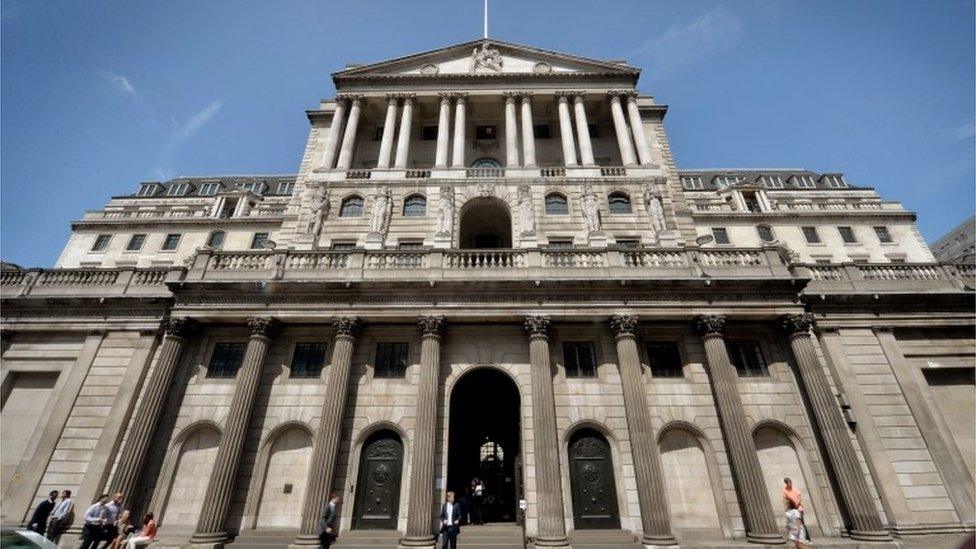Economic forecasts are not 'lunatic'
- Published
- comments

Martin Weale: "Forecasting is uncertain, that's the nature of things, forecasts aren't wrong or right, they are simply the best you can do."
One of Britain's most highly respected economists has hit back at criticisms of economic forecasts.
Critics have described them as little better than astrology or soothsaying.
Martin Weale, a former member of the Bank of England's interest-rate setting Monetary Policy Committee, said that forecasts had to deal with uncertainty.
They could not be expected to precisely predict the economic future but were based on "sensible inferences from past patterns," he said.
Admitting that some forecasts published before the referendum may have been overly-pessimistic, Mr Weale said economists were constantly testing their models and attempting to rectify areas of concern.
Economists had to be aware of "confirmation bias", looking for facts that supported their own beliefs, he warned.
Michael Gove says fresh warnings about the cost of Brexit will be proved wrong.
'Lunatic'
Mr Weale's comments come after Michael Gove, the former justice secretary who supported leaving the EU, criticised economics as a "profession in crisis" which had been proven wrong on joining the single currency and the referendum.
Some of the assumptions the Office for Budget Responsibility used to predict that the Brexit vote could lead to a substantial increase in borrowing have also been described as "lunatic" by Jacob Rees-Mogg MP, a member of the Treasury Select Committee (TSC) who also supported Brexit.
"I think over the last few months in the build up to the referendum and since then we have heard quite a lot of language that to my mind doesn't have any place in serious public debate," Mr Weale told me.
"I think describing forecasts as lunatic really doesn't help anyone at all.
"I would say and he [Mr Gove] may not be aware of this, serious economic forecasters always do carry out a review of their forecasting errors and look at them to try and understand what can be learned from them.
"Economists don't produce a collective view. People agree on some things and disagree on other things.
"So, I think Michael Gove was very much setting up a straw man to knock down in order to justify his own position.
"The public needs to understand that there is considerable uncertainty surrounding forecasts and I think politicians like Mr Gove need to look at what forecasters actually do, how they try and show the uncertainty they face and then perhaps offer suggestions as to how uncertainty might be better communicated."
'Establishment'
Later on Tuesday, Paul Johnson, the director of the Institute for Fiscal Studies, appears before the TSC.
He is expected to be asked about the IFS's prediction that wages could see the longest period of stagnation for seventy years and that by 2021 could still be at the same level as 2008.
John Redwood MP, who supports Brexit, said the IFS was part of a "cosy establishment" which wants to keep Britain in the EU - a position robustly denied by the organisation.
Robert Chote, the chairman of the OBR, appears before the TSC on Tuesday, and is also expected to face criticism.
"The government needs forecasts for the chancellor to be able to say more than 'this is the money I've got at the moment and I've got no idea how much is going to come in next year, so we'll put spending on hold until we work out how things are going'," Mr Weale said.
"That is not the way in which you'd run a business and it's not a way in which you'd run a country."
'Slow motion'
Mr Weale, who sat on the MPC between 2010 and 2016, said the OBR was "rightly" set up to take the politics out of Treasury forecasting and that it had done so successfully.
"People say forecasts all turn out to be wrong," he said.
"I regard that as a silly comment, forecasting is uncertain, that's the nature of things, forecasts aren't wrong or right, they are simply the best you can do.
"The OBR has done that, the Monetary Policy Committee has always tried to do that."
Since the referendum, the UK economy has performed better than the Treasury, the Bank and many economists predicted.
"Well, it is obviously possible that the slow-motion slowdown could be less severe, after all, as everyone has been saying, there is a great deal of uncertainty surrounding any economic forecast," Mr Weale said, adding that the process of leaving the EU was likely to have an "adverse impact" on the UK's economic performance.

The Bank of England has cut its growth forecasts for next year
"There are good reasons to think that investment is likely to be affected by uncertainty.
"Why do something today when things are uncertain, when you don't know what the trading arrangements with the continent are going to be, when if you wait a bit longer at least you will have greater certainty."
Although economic growth for the year has been upgraded, the Bank has downgraded growth for next year and has said that overall the economy could be up to 2.5% smaller by 2018 because of the Brexit vote.
'Squeeze'
"People talk about it booming [this year], but actually half a per cent growth a quarter isn't a boom, it's 2% growth a year, which is nice to have, but that's not going to make up the ground that has been lost since before the [financial] crisis," Mr Weale said.
"Will that continue? Well, we do expect to see something of a squeeze on pay developing as inflation picks up in light of the fall in the exchange rate.
"The fall in the value of sterling will be a help in terms of demand, but you have to bear in mind in the short term it is likely to lead to a squeeze on consumption as people find their spending goes less far as prices are rising, or rising more rapidly than what would have been the case."